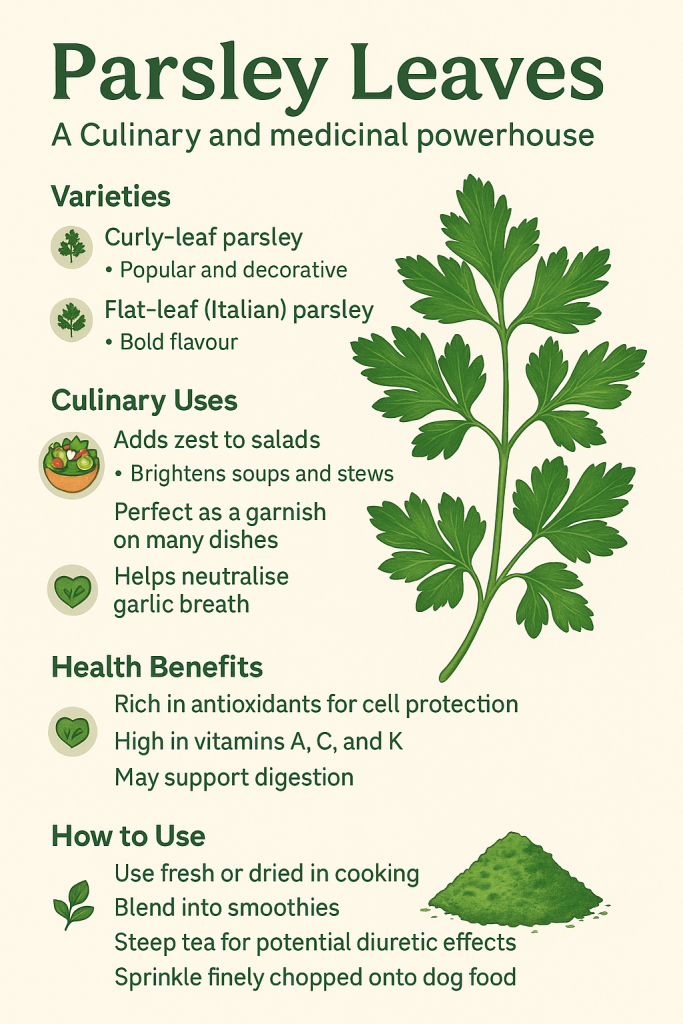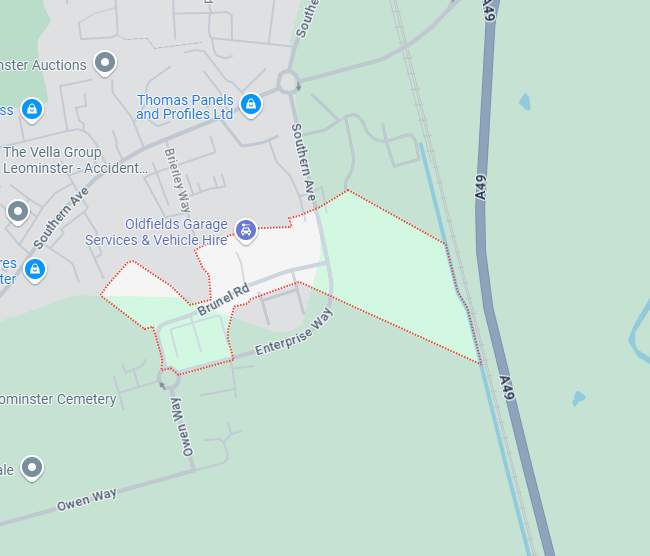Parsley Leaves: The Underrated Herb with Surprising Benefits
For a herb that’s found in nearly every kitchen, parsley leaves don’t get nearly enough credit. We sprinkle them on top of pasta or soup as garnish—but how often do we stop and ask, what do parsley leaves actually do for our health? That’s exactly what we’re diving into today.
So, let’s look beyond the garnish and explore why parsley leaves might deserve a more permanent place on your plate.
What Are Parsley Leaves?
Parsley (Petroselinum crispum) is a bright, leafy green herb from the Mediterranean region. It comes in two main varieties: curly parsley and flat-leaf parsley (also known as Italian parsley). Both offer similar health benefits, but flat-leaf tends to have a stronger flavour.
Whether you use them fresh or dried, parsley leaves pack more of a punch than many realise—especially when it comes to nutrition.
Packed with Nutrients
Don’t be fooled by its light and leafy appearance—parsley is a nutritional powerhouse. These little green leaves contain:
- Vitamin K1, which plays a crucial role in blood clotting and bone strength.
- Vitamin C, known for boosting immunity and supporting skin.
- Vitamin A, which supports both vision and immune function.
- Iron, essential for producing red blood cells.
- Folate, a B vitamin needed for cell repair and DNA synthesis.
Because we usually eat parsley raw, our bodies can fully absorb these fragile, heat-sensitive nutrients. As a result, that makes it a useful addition to any balanced diet.
Parsley leaves are a versatile herb that not only adds flavour to your meals but also offers numerous health benefits. If you’re interested in incorporating more nutrient-dense options into your diet, consider trying our flaxseed bread recipe. It’s a wholesome addition that complements the benefits of parsley.
Health Benefits of Parsley Leaves
Beyond its taste, parsley offers several notable health benefits:
1. Natural Detox Support
Parsley acts as a gentle diuretic, helping the body flush out excess fluid and toxins. Therefore, it’s a helpful herb for those looking to support their kidney function naturally.
2. Heart and Blood Health
Thanks to high folate and vitamin K content, parsley can help support cardiovascular function and maintain healthy blood clotting. Additionally, its antioxidants also help reduce inflammation in the body.
3. Digestive Support
For generations, people have used parsley to ease bloating and promote digestion. Consequently, adding a handful of fresh parsley to meals may help relieve gas and support liver health.
4. Breath Freshener—Even for Dogs!
Believe it or not, parsley leaves are sometimes used as a natural breath freshener. For example, some pet owners mix a little chopped parsley into their dog’s food to help with bad breath. (Of course, check with your vet first.)
5. Skin and Eye Health
Thanks to its vitamin A and C content, parsley supports collagen production, which keeps skin healthy. It also contributes to good vision, making it a helpful herb for long-term wellness.
How to Use Parsley Leaves
One of the best things about parsley is how easy it is to add to your meals. Try it:
- Chopped into salads, soups, or scrambled eggs
- Blended into sauces like chimichurri or green pesto
- Steeped in hot water to make herbal tea
- Added to smoothies or juices for an extra nutrient kick
Flat-leaf parsley works well in cooked meals, while curly parsley holds its shape better as a garnish. Either way, both offer great flavour and nutrition.
Are There Any Side Effects?
Parsley is generally safe for most people. However, since it’s rich in vitamin K, people on blood thinners like warfarin should avoid consuming large amounts without speaking to a doctor. Also, parsley contains oxalates, which may be an issue for those prone to kidney stones.
Final Thoughts: More Than a Garnish
So, are parsley leaves worth adding to your daily diet? Definitely. With a mild taste, high nutritional value, and a surprising list of health benefits—from kidney support to fresher breath—it’s far more than just a garnish.
Whether you’re mixing it into meals or sipping it as a tea, parsley deserves a proper place in your kitchen. In short, it’s time to rethink this humble herb. While parsley offers a refreshing boost to digestion and overall health, it’s also worth exploring other herbs that support your wellbeing naturally. If you’re curious, take a look at the many dill herb uses, from enhancing meals with fresh flavour to calming an unsettled tummy after eating.
We hope that you found some useful information about this unique herb and its great health benefits for us. Mother nature never stops giving. Below are a couple of links to other posts that you may well want to have a look at. Have a great positive day.





